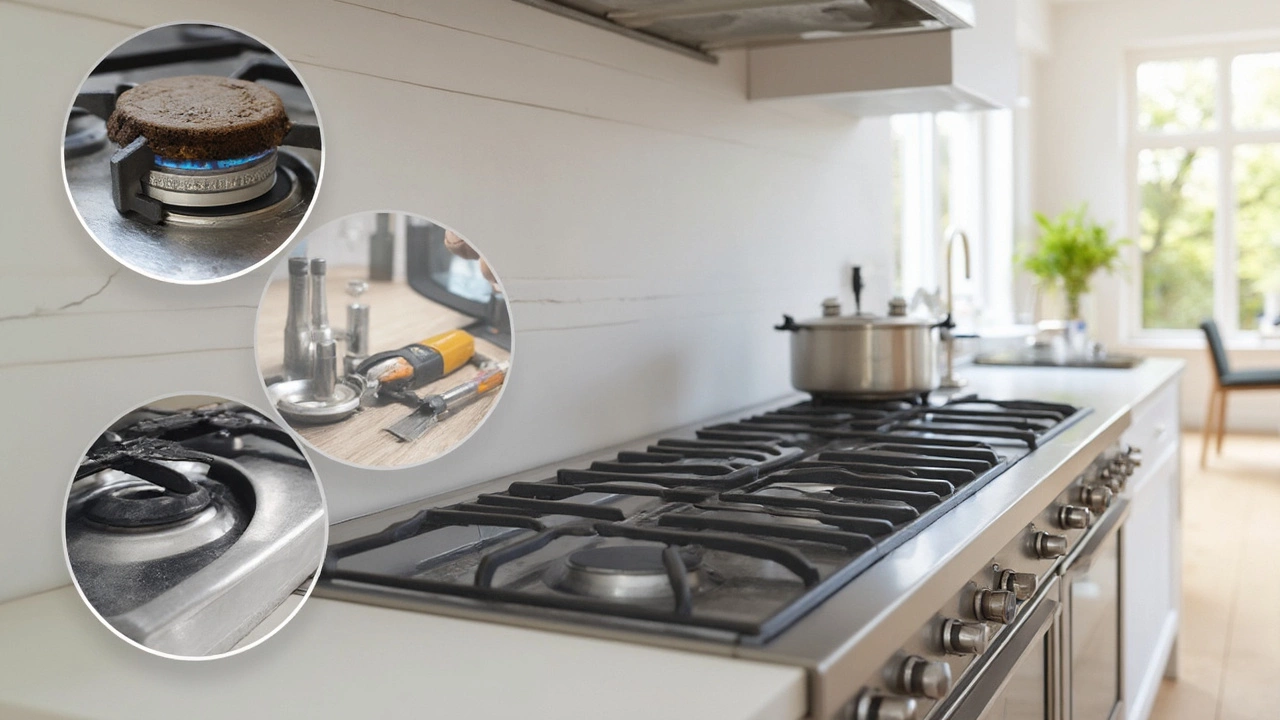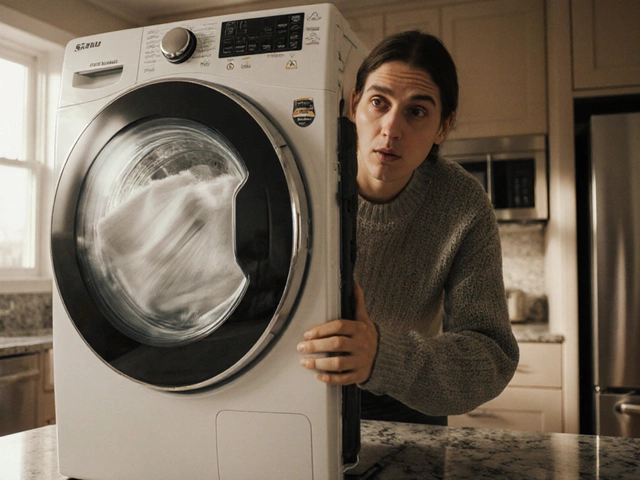Think your cooker will last forever? It won't. Most people don't realize that cookers actually have a shelf life—just like the cheese in your fridge—only a lot less obvious.
If your kitchen feels like the heart of your home, your cooker is the main heartbeat. But nothing is built to run perfectly forever, especially when it’s hit with daily use, spills, and the occasional experimental recipe gone wrong. Figuring out how long yours should last, and when it’s safer (and maybe even cheaper) to swap for a new one, saves you stress and keeps your cooking on point.
Let’s break down how long you can expect your gas or electric cooker to actually last under normal use, and how to see the real signs that it’s time to move on. Trust me, you don’t want to be stuck in the middle of dinner with a failing oven—or worse, dealing with a safety hazard you missed for months.
- How Long Cookers Usually Last
- Big Warning Signs You Need a New One
- Tips to Make Your Cooker Last Longer
- When Repair Beats Replacement (and When It Doesn’t)
How Long Cookers Usually Last
If you’re wondering how often you should replace a cooker, you’ll want to know the average lifespan first. In most homes, a standard gas cooker chugs along for about 12 to 15 years before giving up. Electric cookers generally aren’t far behind—they can last 10 to 13 years if you're not too rough on them. Flip to induction cookers, and they might last even a couple years longer.
It’s not just about the type, though. Your maintenance habits, how often you use it, and even power surges all play a role. A cooker that’s cleaned regularly, with spills wiped up and seals checked, has a much better shot at reaching the end of its expected lifespan. Meanwhile, a cooker that’s never cleaned, or that’s used like a pro chef every day, will probably break down sooner.
| Cooker Type | Average Lifespan (Years) |
|---|---|
| Gas Cooker | 12-15 |
| Electric Cooker | 10-13 |
| Induction Cooker | 13-16 |
Brand makes a difference, too. Some of the well-known brands will last a year or two longer, but don’t get too comfortable. Even if your cooker still heats up after a decade, it might not be as efficient—and that can mean higher energy bills or uneven cooking.
If you use your cooker almost every day, especially for big families or meal prep, expect it to be at the lower end of these ranges. If you only fire it up once or twice a week, you might squeeze a few more years out. Either way, keeping track of when you bought your cooker and how hard you push it is key to planning ahead for repair or replacement.
Big Warning Signs You Need a New One
Don’t wait for a full kitchen meltdown before thinking about replacing your cooker. Most folks see little glitches and hope they’ll go away. Spoiler: they won’t. Ignoring obvious warning signs can lead to wasted money, ruined meals, or even a legit safety risk.
Here are the top red flags you can’t ignore:
- It takes forever to heat up. If the oven drags its feet, the heating elements might be shot. Gas burners that sputter or burn unevenly are another tip-off that things aren’t running right.
- Weird smells or smoke. Random smoke, odd metal or gas smells, or a burning stench are always bad news. According to the UK’s Gas Safe Register, persistent gas smells indoors mean it’s time to call a pro—today, not tomorrow.
- Knobs and controls don’t respond. When buttons don’t work or the oven door won’t seal, repairs stop making sense quickly. Plus, loose wiring or faulty seals can be a fire hazard.
- Uneven cooking or burnt food. If you’re seeing half-raw and half-burned results, the heating system’s probably failing. Newer cookers are much more reliable if you cook often.
- Visible rust, cracks, or melted parts. Any sign of physical wear—rusted surfaces, chipping enamel, or warped metal—equals trouble, especially around burners or heating plates.
If your cooker is over 10-15 years old, these issues pop up more often. A 2023 consumer report found that most cooker repair jobs jump in cost after year eight, with almost half of owners choosing to just buy a new one after one big repair.
| Common Cooker Issues | Repair or Replace? |
|---|---|
| Burner won’t light | Repair (if it’s a simple fix) |
| Repeated electrical faults | Replace |
| Worn out door gasket | Repair |
| Visible damage or heavy rust | Replace |
Here’s a quote from appliance safety expert Laura Fitch:
“If your cooker starts smelling like gas or overheating for no reason, don’t ignore those signs—get it checked or think about replacing it. These symptoms aren’t just annoying; they can be dangerous.”
Bottom line? If your cooker shows more than a couple of these big warning signs, it’s probably time to swap it out. Holding on for too long just isn’t worth the risk—or the hassle.

Tips to Make Your Cooker Last Longer
If you want your cooker sticking around for years, a little bit of care goes a long way. Most gas and electric cookers can easily go 10 to 15 years with decent upkeep. Here’s how you can milk every bit of life out of yours and avoid common cooker repair bills and early replacement.
- Clean spills right away: Grease and burnt-on food build up over time, making heating less efficient and causing annoying smells. A quick wipe after using the cooker is honestly the best way to avoid problems down the line.
- Deep clean every few months: Take out all removable parts—trays, burners, knobs—and give them a proper soak. For electric cookers, unplug before you start. For gas, make sure controls are off.
- Don’t slam doors or knobs: Sounds obvious, but yanking the door or forcing knobs only leads to loose fittings and can mess up seals. Keep things gentle.
- Check the seals and gaskets: A faulty oven door seal leaks heat, slows cooking, and wastes energy. Inspect the rubber or felt strip at least twice a year. If it’s hard, cracked, or loose, swap it out. It's a cheap fix compared to buying a new cooker.
- Ventilate when cooking: Built-up moisture inside the cooker causes rust and electrical problems. Leave the door slightly open when it’s cooling down (unless your cooker’s manual says not to).
- Watch out for odd smells or noises: If you get a gas smell or hear anything weird, turn the cooker off and call a pro right away. It’s not something to mess with.
- Annual safety checks: Get a qualified technician to check your cooker at least once a year, especially for gas cookers. They catch little issues before they turn into big cooker repair problems.
Regular care isn’t just about making your appliance last longer; it’s also about keeping your kitchen safe and your bills low. A recent UK survey showed that people who cleaned their ovens monthly cut their oven repair costs in half over five years compared to those who cleaned once a year or less. That’s less cash out of your pocket and fewer headaches down the road.
When Repair Beats Replacement (and When It Doesn’t)
Not every dodgy burner or broken knob means it’s time to toss out your trusty cooker. Sometimes, a simple cooker repair can buy you a lot of extra years. Other times, though, you’ll spend more fixing it than a new unit would cost. So, how do you decide?
Start by looking at the age of your cooker. If it's younger than 8 years and the problem isn’t massive—like a burner not lighting or a faulty thermostat—repair usually makes sense. Replacement parts for things like heating elements, oven doors, or control knobs are easy to find and not too pricey. For gas cookers, even fixing ignition switches or valves is straightforward for someone who knows what they're doing.
But if your cooker’s pushing 10 or more years, or you’re shelling out cash for repairs every few months, that’s a red flag. Major issues—like electrical shorts, constant gas leaks, or the oven refusing to heat evenly—are usually a sign it’s time to say goodbye. Plus, manufacturers often stop making parts for older models, so repairs get trickier and more expensive.
| Common Problem | Average Repair Cost | Worth Fixing? |
|---|---|---|
| Burner not working | $70–$120 | Usually yes |
| Broken oven door | $100–$200 | Yes if rest is working |
| Heating element out | $110–$220 | Worth it if unit is under 10 years |
| Major wiring issue | $300+ | Usually not |
| Gas leak | $150–$400 | Only if cooker is newer |
Another thing to think about: Energy efficiency. Newer cookers use way less power or gas. If your old unit sends your energy bill through the roof, the savings from an upgrade might surprise you over a few years.
Here’s a quick checklist to help you decide:
- If repair costs are more than half the price of a new cooker, go for a replacement.
- If you’re calling a repair tech more than once a year, replacement is smarter.
- If you’ve got safety problems (strange smells, sparks, flickering flames), don’t risk it—replace right away.
Every home is different, but these tips will keep your kitchen running smoothly—without wasting money on pointless repairs.




